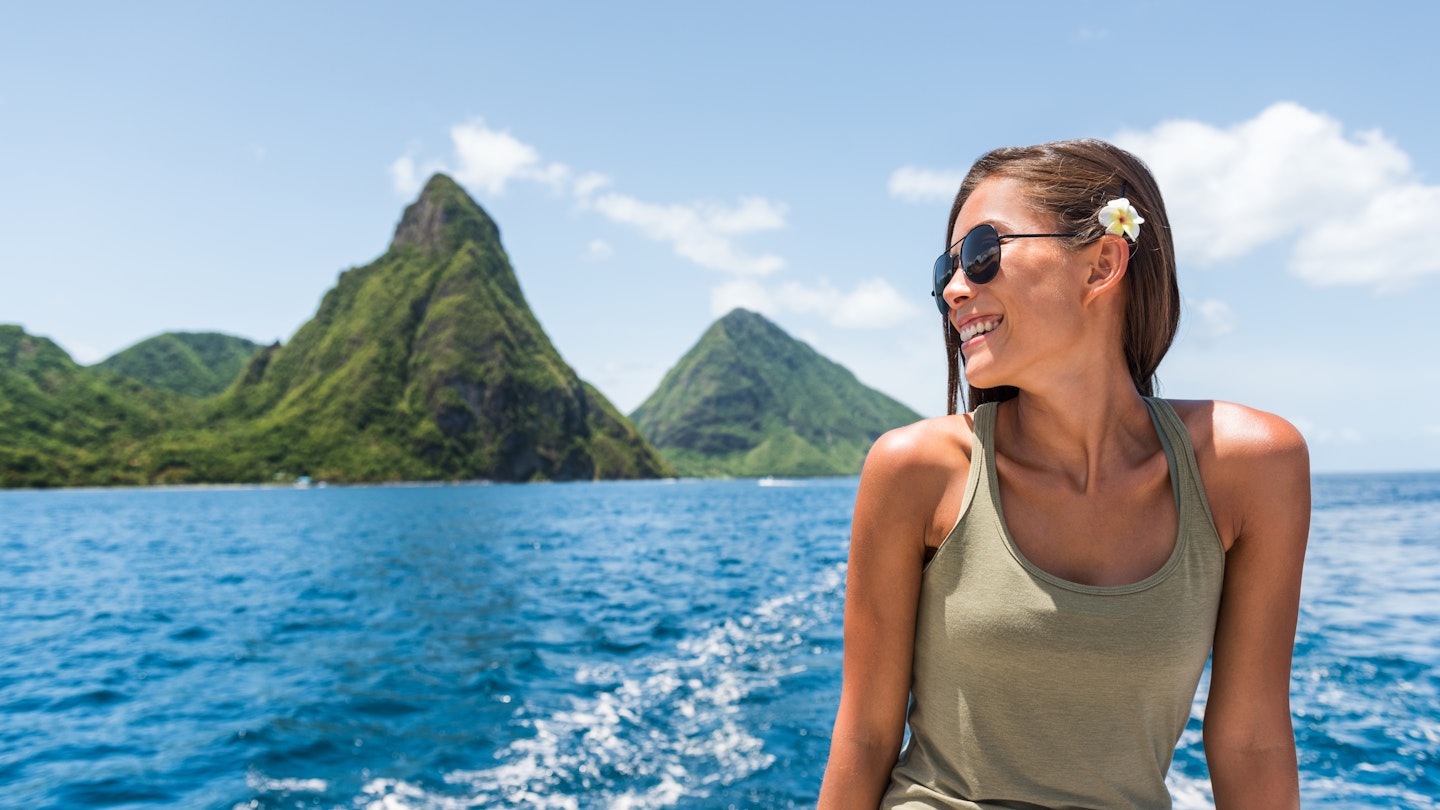Traveling to St Lucia is an experience like no other, from the volcanic beaches and emerald-dipped landscape to the mouthwatering cuisine.
As someone who was born and raised on the island, I find it impossible to exhaust the wonders of my favorite Caribbean jewel. I always opt for a window seat on the left side of a flight back home just to see the magnificent Pitons slowly come into view, and I will never tire of searching for the best bakes and accras outside of my grandmother’s recipe.
St Lucia has a well-earned reputation as one of the most tranquil and exquisite places to visit. If you’ve never been, you might have some questions: What is the best way to take it all in? What attire suits the tropical climate? What about hurricane season? Here are a few important things to know before you pack your bags for the Helen of the West Indies.
1. A Greeting Goes a Long Way
St Lucians are very courteous people, as you will quickly observe. You will hear variations of “good morning,” “good afternoon,” or “good night” when you enter any store, public bus, or restaurant.
Not reciprocating might draw curious looks and get you branded with the dreaded “unmannerly” label. When the chance arises, feel free to engage in light banter with local residents, especially vendors. The community’s elders are typically treated with respect.
2. Marijuana Was Only Recently Decriminalized
The casual use of marijuana is a common Caribbean trope. In reality, St Lucia decriminalized the personal use of small amounts of cannabis (30 grams or less) in 2021. A second piece of legislation aimed to clear the records of individuals caught with less than 30 grams.
The government has discussed plans to launch a public awareness campaign and a medical marijuana program, with potential legislation in the works. However, these plans are still in the early stages of development.
3. Always Carry Some Cash
Credit and debit cards are widely accepted at major businesses, hotels, and establishments. However, cash remains the most common payment method, and the official currency of the island is the Eastern Caribbean dollar.
When using public transportation or purchasing from roadside vendors, having cash on hand will be particularly useful. US dollars or euros can also be used, but it’s wise to have some EC dollars just in case.
ATMs and banks are available across the island for currency exchange, but it’s best to verify any foreign transaction fees from your home bank before leaving.
4. The Roads Are a Maze of Sharp Turns and Bends
The island’s roads are filled with unexpected turns, and some potential hazards should be noted before driving. St Lucians drive on the left-hand side of the road, differing from countries like the United States and Canada. Drivers often make sudden stops without warning, particularly public buses, and speeding is common.
5. Hurricane Season is Not Off-Limits
St Lucia is warm and balmy throughout the year, but the hurricane season, which coincides with the rainy season, begins in June and runs through November. However, it is rare for rain to persist for days at a time.
Most hurricanes that hit the island are usually weaker than those that impact islands to the northwest and the US mainland. Still, it is essential to stay informed about the weather forecasts and hurricane precautions.
6. Dress for the Occasion
During carnival celebrations, revelers may shed layers of fabric as a nod to the tradition’s roots in emancipation. However, there are limits—going topless or nude on the beach is a significant no-no.
Most St Lucians identify as Christians, and conservative attitudes prevail. Observance of Catholic holidays is common, with churches found throughout the island. When participating in worship, moderate-length clothing is recommended to uphold modesty.
7. Is St Lucia Welcoming to the LGBTQIA+ Community?
St Lucia, like many Caribbean nations, tends to hold conservative views towards the LGBTQIA+ community. Public displays of affection are rare, and certain homosexual acts remain illegal, though enforcement is uncommon.
The island has made strides toward inclusivity, passing the historic Domestic Violence Act in 2022, which provides legal protections for same-sex couples. This makes St Lucia one of the few Caribbean nations to expressly forbid discrimination based on sexual orientation and gender identity.
8. Don’t Be Afraid to Feed the Strays
Dogs and other pets are often welcome at various accommodations. It’s not unusual to find cats roaming around some hotels and outdoor restaurants. However, larger pets like dogs may not be permitted in business establishments.
You will encounter friendly stray dogs along the beaches, particularly in the Pigeon Island area, who are accustomed to receiving food from kind visitors.
9. Is St. Lucia Safe for Solo Female Travelers?
Traveling around St. Lucia by yourself is generally safe. Public transportation options, such as taxis and buses, are typically reliable. However, crowded areas can be prime spots for petty theft, including pickpocketing.
As the capital city of Castries is bustling during the day and quieter at night, take precautions to ensure your safety:
- Keep your cell phone handy for emergencies. Local SIM cards are available via telecommunications companies throughout the island.
- Avoid getting into a vehicle with strangers; stick to authorized transportation options like public buses and licensed taxis.
- Limit the amount of cash you carry and use cards whenever possible for larger purchases.
- Inform someone you trust about your plans before heading out for the day.





